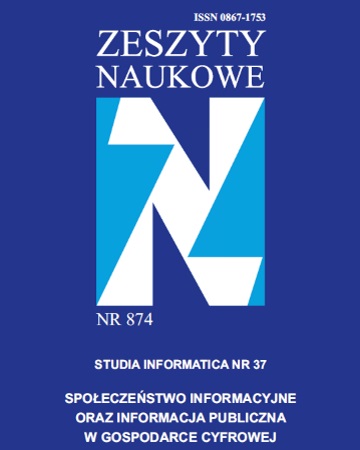
ISSN: 0867-1753
eISSN: 2300-410X
OAI
DOI: 10.18276/si.2015.37-09


Issue archive /
ZN 874 SI nr 37
Stan udostępniania publicznych e-usług w wybranych krajach Unii Europejskiej
(E-government services in selected EU countries)
| Authors: |
Joanna
Papińska-Kacperek
Uniwersytet Łódzki Aleksander Wassilew Szkoła Główna Handlowa |
| Keywords: | public e-services digital public services e-government e-health |
| Data publikacji całości: | 2015 |
| Page range: | 14 (115-128) |
Abstract
The article presents the state of providing online public services. There were compared the available data about some e-government services for the four countries of the European Union. The analysis concerns two countries founding the EU, namely France and United Kingdom, and one of the groups of countries joined later – Poland and Bulgaria. The analysis takes into account the level of using digital services in dealing with the public administration (for citizens and enterprises) and describes how services are provided on the central government portals, digital services related to declarations for the personal income taxes and selected medical services.
Download file
Article file
Bibliography
| 1. | Capital (2014), От 2015 г. данъчни декларации ще се подават онлайн и без е-подпис, (biuletyn elektroniczny), www.capital.bg/politika_i_ikonomika/bulgaria/2014/11/12/2418131_ot_2015_g_danuchni_deklaracii_shte_se_podavat_onlain_i/ (22.03.2015). |
| 2. | Digital Agenda (2011), Digital Agenda: more EU citizens benefitting from online public services, IP/11/206. |
| 3. | Eurostat (2014), Individuals using the internet for interaction with public authorities, http://ec.europa.eu/eurostat/tgm/table.do?tab=table&init=1&language=en&pcode=tin00013&plugin=1 (22.03.2015). |
| 4. | Eurostat (2015), Manage administrative procedures by returning filled forms electronically to public authorities, http://appsso.eurostat.ec.europa.eu/nui/showdo?dataset=isoc_cieg_map& lang=en (22.03.2015). |
| 5. | Greenhalgh T., Hinder S., Stramer K., Byrne E., Russell J., Poots W. (2010), Adoption, non-adoption, and abandonment of a personal electronic health record: case study of HealthSpace, BMJ, 341. |
| 6. | Grudzińska-Kuna A., Papińska-Kacperek J. (2012), Usługi elektronicznej administracji dla obywateli w Polsce – wybrane aspekty, „Roczniki Kolegium Analiz Ekonomicznych”, nr 24, s. 119–131, SGH, Warszawa. |
| 7. | Hansford A., Lymer A., Pilkington C. (2006), IT Adoption Strategies and their Application to e-Filing Self-Assessment Tax Returns: The Case of the UK, „eJournal of Tax Research”, no. 4 (1). |
| 8. | Hristow H. (2015), Електронното управление в България. Стратегически насоки, X-та Национална конференция по е-здравеопазване „Иновационен модел за устойчиво и модерно здравеопазване”, София, www.ehealth-bg.org/images/0227113752-10.10-10.25_E-health_Hristo |
| 9. | IHE (2013), Implementation Case Study: French Electronic Health Record Program. |
| 10. | IS (2015), Електронна услуга за подаване на данъчни и осигурителни декларации и формуляри по електронен път, https://inetdec.nra.bg/docs/InetDec_Client.pdf (22.03.2015). |
| 11. | Jupp V. (2003), Realizing the Vision of eGovernment, „Journal of Political Marketing”, no. 2 (3–4), s. 128–145. |
| 12. | Kierkegaard P. (2012), E-Prescription across Europe, „Health and Technology”, no. 3 (3), s. 205–219. |
| 13. | Komisja Europejska (2010), Digitizing Public Services in Europe: Putting Ambition into Action, 9th Benchmark Measurement. |
| 14. | Komisja Europejska (2014), Delivering the European Advantage How European governments can and should benefit from innovative public services? |
| 15. | Komisja Europejska (2015), The Digital Economy and Society Index (DESI), Progres by Country, http://ec.europa.eu/digital-agenda/en/progress-country (22.03.2015). |
| 16. | Kożuch B., Kożuch A. (2011), Istota współczesnych usług publicznych, w: Usługi publiczne. Organizacja i zarządzanie, red. B. Kożuch, A. Kożuch, ISP UJ, Kraków. |
| 17. | Lusignan S. de, Seroussi B. (2013), A comparison of English and French approaches to providing patients access to Summary Care Records: scope, consent, cost, Data and Knowledge for Medical Decision, Support B. Blobel et al. (eds.) IOS Press, s. 61–65. |
| 18. | MTITC (2014), Стратегия за развитие на електронното управление в Република България, 2014–2020 г., www.mtitc.government.bg/upload/docs/2014-03/1_StrategiaRazvitieEU_RBulgaria_2014_2020.pdf (22.03.2015). |
| 19. | MZ (2011), Ministry of Health to begin development of national health information system. eHealth Foundation Bulgaria, www.ehealth-bg.org/bg/view_news.php?news_id065 (22.03.2015). |
| 20. | OECD (2013), Tax Administration 2013: Comparative Information on OECD and Other Advanced and Emerging Economies. |
| 21. | ONZ (2014), United Nations E-Government Survey 2014, 25 June, New York. |
| 22. | PSNC (2014), Electronic Health Records – Pharmacy Access to the SCR, http://psnc.org.uk/contract-it/pharmacy-it/electronic-health-records/ (22.03.2015). |
| 23. | Turner L., Apelt C. (2004), Globalisation, Innovation and Information Sharing in Tax Systems: The Australian Experience of Diffusion and Adoption of Electronic Lodgement, „eJournal of Tax Research”, no. 2 (2), s. 241–269. |